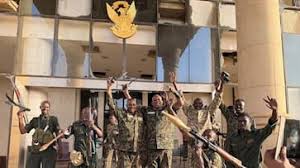March 21, 2025 – Khartoum, Sudan.
In a significant development in Sudan’s deadly ongoing conflict, the Sudanese Armed Forces (SAF) have regained the Presidential Palace in Khartoum from the paramilitary Rapid Support Forces (RSF), a massive victory for the government. The RSF, which has held sway over large parts of the country since the conflict erupted in April 2023, had held the capital for most of the conflict.
The heavy fighting between the SAF and the RSF has caused one of the world’s most devastating humanitarian crises, with over 28,000 people reported dead and over 11 million displaced, according to data from the Armed Conflict Location and Event Data Initiative. The fighting, particularly in Khartoum, has witnessed several civilians caught in the crossfire, facing constant violence and destruction.

On Friday, Sudan’s government defiantly announced retaking the Presidential Palace, a power seat in the capital. The Minister of Information, Khalid Al-Aiser, celebrated the victory in a social media post, saying, “Today the flag is raised, the palace is back, and the journey continues until victory is complete.”
Related News
Uganda has Deployed Troops to DR Congo’s to Combat M23 Rebels
However, despite this win, large parts of Khartoum remain in the hands of RSF, and the militia still holds sway over vast portions of the country, including Darfur in the west, where ethnic fighting has increased. The northern and eastern regions of Sudan are now under SAF control.
The recapture of Khartoum is a major symbolic win for the Sudanese army, as the RSF had been attempting to establish a parallel government in the capital. But the battle for the city has been at terrible expense to civilians, who have endured constant bombardment and attacks.
The United Nations stated that dozens of civilians, including humanitarian workers, have been killed by artillery shelling and airstrikes from both the SAF and RSF. Seif Magango, a spokesperson for the UN Human Rights Office, indicated the attacks have been concentrated in eastern Khartoum and north Omdurman since mid-March.
Both sides have faced international condemnation for their actions, with numerous reports of war crimes. In January, the United States accused the RSF of committing acts of genocide, marking the second time in two decades that Sudan has faced allegations of such atrocities. Meanwhile, a recent UNICEF report has linked the SAF to sexual violence, with disturbing accounts of attacks on children as young as one year old.
Related News
Uganda has Deployed Troops to DR Congo’s to Combat M23 Rebels
Magango further indicated that the RSF and its allied militias have taken to violent means, including assaulting homes in eastern Khartoum, conducting summary executions, and detaining civilians arbitrarily. The RSF has also been accused of looting food and medicine from communal kitchens and clinics. On the other hand, the SAF and its allies have equally been accused of the very same acts of looting and committing crimes in territories under their control, including Khartoum North (Bahri) and East Nile.
Despite repeated demands for a ceasefire and international intervention, the violence has only intensified with no end in view. The retaking of the Presidential Palace by the Sudanese army, while a huge victory, underscores the ongoing battle for control of the capital and the country in general. It remains to be seen if this victory will be used to reverse the tide of the war or if Sudan will be further engulfed in destruction as both forces press on with their respective military campaigns.
As the conflict drags on, humanitarian agencies across the world warn of further deterioration of living conditions, with millions of civilians facing hunger, displacement, and insecurity. The world watches as Sudan grapples with the aftermath of a vicious war, and the future of the country remains in limbo.
Related News
Uganda has Deployed Troops to DR Congo’s to Combat M23 Rebels

Contributed by Janet Alpha from Ekiti State and Edited by Mr. Chibueze Onwuka
